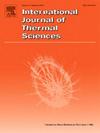纳米液滴成核过程中的接触角演变
IF 4.9
2区 工程技术
Q1 ENGINEERING, MECHANICAL
International Journal of Thermal Sciences
Pub Date : 2024-10-13
DOI:10.1016/j.ijthermalsci.2024.109469
引用次数: 0
摘要
蒸汽冷凝因其传热系数高而被广泛应用于热管理技术和能源发电厂的冷凝器中。接触角是调节蒸汽冷凝速率的关键因素,因此微/纳米工程制造的各种润湿性表面得到了快速发展。然而,凝结初期的成核纳米液滴(1-100 nm)表现出与宏观液滴不同的润湿动力学,其机理尚不十分清楚。在这项工作中,我们进行了分子动力学(MD)模拟,研究纳米液滴成核过程中接触角的演变。结果表明,在疏水表面上,纳米液滴的成核接触角小于经典 Young 方程预测的接触角,而在亲水表面上,纳米液滴的成核接触角则与之相反。此外,为了解释这一发现,我们还计算了在不同润湿性表面上成核纳米液滴的线拉力,结果发现在疏水表面上成核纳米液滴的线拉力为正,而在亲水表面上成核纳米液滴的线拉力为负。此外,计算出的线拉力在 10-11 J/m 的数量级,与文献记载的数据非常吻合。本文章由计算机程序翻译,如有差异,请以英文原文为准。
Contact angle evolution during nanodroplet nucleation
Vapor condensation is widely adopted in thermal management technology and condenser of energy power plant, benefiting from its high heat transfer coefficient. Contact angle is the key factor to regulate vapor condensation rate, leading to the rapid development of surfaces with various wettability fabricated by micro/nanoengineering. However, the nucleated nanodroplets (1–100 nm) at the beginning of condensation exhibit different wetting dynamics from macroscopic droplets, the mechanisms of which are not well understood. In this work, we perform molecular dynamic (MD) simulations to study the evolution of contact angle during nanodroplet nucleation processes. The results show the nucleated contact angle of a nanodroplet is smaller than the contact angle predicted by the classical Young equation on a hydrophobic surface, while it is opposite for nanodroplet nucleating on hydrophilic surface. Moreover, we have calculated line tension for the nucleated nanodroplet on the surfaces with different wettability to explain this discovery, and found positive line tension on hydrophobic surface, while negative line tension for nucleated nanodroplet on hydrophilic surface. Furthermore, the calculated line tension, which is at the order magnitude of 10−11 J/m, aligns well with the data documented in the literature.
求助全文
通过发布文献求助,成功后即可免费获取论文全文。
去求助
来源期刊

International Journal of Thermal Sciences
工程技术-工程:机械
CiteScore
8.10
自引率
11.10%
发文量
531
审稿时长
55 days
期刊介绍:
The International Journal of Thermal Sciences is a journal devoted to the publication of fundamental studies on the physics of transfer processes in general, with an emphasis on thermal aspects and also applied research on various processes, energy systems and the environment. Articles are published in English and French, and are subject to peer review.
The fundamental subjects considered within the scope of the journal are:
* Heat and relevant mass transfer at all scales (nano, micro and macro) and in all types of material (heterogeneous, composites, biological,...) and fluid flow
* Forced, natural or mixed convection in reactive or non-reactive media
* Single or multi–phase fluid flow with or without phase change
* Near–and far–field radiative heat transfer
* Combined modes of heat transfer in complex systems (for example, plasmas, biological, geological,...)
* Multiscale modelling
The applied research topics include:
* Heat exchangers, heat pipes, cooling processes
* Transport phenomena taking place in industrial processes (chemical, food and agricultural, metallurgical, space and aeronautical, automobile industries)
* Nano–and micro–technology for energy, space, biosystems and devices
* Heat transport analysis in advanced systems
* Impact of energy–related processes on environment, and emerging energy systems
The study of thermophysical properties of materials and fluids, thermal measurement techniques, inverse methods, and the developments of experimental methods are within the scope of the International Journal of Thermal Sciences which also covers the modelling, and numerical methods applied to thermal transfer.
 求助内容:
求助内容: 应助结果提醒方式:
应助结果提醒方式:


